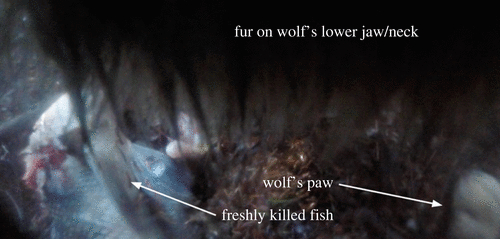Camera Traps Reveal Wolves Go Fishing A Lot
Camera traps have revealed that wolves go fishing more than researchers have ever realized.
In 2017, biologists at the Voyageurs Wolf Project captured a video of wolves catching and eating fish out of a small stream back.

At the time, the research team, who are based in Minnesota, U.S., thought this was likely a unique occurrence.
However, after observing wolves for five straight years with camera traps, they discovered this was absolutely not the case.
In a study published in The Royal Society journal last month, researchers revealed how they monitored wolves every summer from 2017 to 2021 using a combination of remote cameras as well direct observations.
One wolf was even fitted with a GPS collar containing a camera that recorded footage of it hunting and eating fish.

Scientists discovered that wolves across different packs were actively returning to their preferred rivers and creeks every year to catch fish.
Camera trap videos recorded by the Voyageurs Wolf Project showed wolves in the area waiting on creek banks and ambushing their prey by plunging their noses into the water and catching fish in their jaws — a strategy similar to how wolves hunt salmon in British Columbia and Alaska.
Such observations add to growing evidence that wolf hunting behavior is more flexible than the chasing behaviors wolves are typically associated with to hunt deer, elk, and moose.
The team at Voyageurs Wolf Project believe that this switch of prey species might be related to safety.
“Wolves’ main weapon is their mouth, so going after prey such as deer can cause a severe injury,” lead author Dani Freund tells the University of Minnesota.
“Fish on the other hand can’t do much to a wolf, and wolves seem to be taking advantage of that. Some wolves seemed to completely pass up larger prey such as beaver when fish were available and abundant.”
The Voyageurs Wolf Project project has made several other incredible discoveries through the use of camera traps, including observing their ability to lie in wait to kill beaver and foraging for blueberries at certain times each summer.
The full study can be read here.
Image credits: All photos via “The ethology of wolves foraging on freshwater fish in a boreal ecosystem” in The Royal Society journal, May 2023.